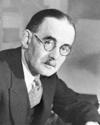
|
Harold Laski |

I was privileged to meet Harold Laski.
I met him just once and a few months after that meeting he died.
But that one meeting dictated the course of my life for the next three years and - conjecturally - considerably longer.
Our meeting came about because of my uncertainty about which course of study I should follow at University. The year that I was accepted by the London School of Economics and Political Science (LSE) to read for a BSc (Econ) degree was the first year that the syllabus changed from what was to be known as "old regs" to "new regs". Under old regulations one would be compelled to complete the degree course in a maximum of two years and it was conditional upon having obtained sufficient qualifications in one's Intermediate BSc examination. The alternative was to plump for new regulations, which covered a three-year period of study, but involved at least three or four extra subjects depending upon one's choice of major subject.
I was quite conflicted over this choice. There was a great temptation to accept the offer of the "two-year deal" for which I was qualifed, which was a much simpler syllabus, and also offered the possibility of a B.Com rather than a BSc degree, which was even simpler. The snag being that, failure to gain the degree in two years did not carry the option of re-sitting in a third year. That degree syllabus was to be, literally, discontinued at the end of two years. But if I went for the new regulations option, I would have an extra year of study, with the possibility of referral if I "just missed out".
After discussing my choices with an advisor, I opted for the new regulations. This involved six fixed subjects, one main subject, and two alternatives dependent upon which main had been chosen. After much consideration I chose anthropology as my main subject. (I know! I know! I really no longer know why!) My alternative subjects comprised two areas of sociology. After some time devoted to this course and culminating in producing an essay on a related subject of one's choice, I felt absolutely that I had made the wrong decision. I went back to my tutor and asked if it was possible to change my main subject choice from Anthropology to Government. She said it was possible, but it depended upon my being approved by the Head of Department, and she arranged a meeting.
Thus I came to meet Harold J. Laski!
He was brilliant. And terrifying! I mean, I was pretty well overawed before even meeting him. He had such an enormous reputation and had long been one of my political heroes. But I felt myself transfixed by his eyes that seemed to be enlarged by his spectacles as he asked me why I would want to change, so to speak, horses in mid-stream. They are probably not his words but merely convey the sense. I stammered out some sort of unintelligent reply. He then asked what it was that had appealed to me about anthropology and why that was no longer the case. As I wasn't too sure myself, I imagine that the answer I then gave was even less intelligent. But why government? Well, I was on surer ground here, and trying to avoid being too sycophantic I said that it was a subject that I had done particularly well in for my Inter BSc exam and that I also admired his works so much that I wanted the opportunity to work within his department.
He stared at me still more fiercely, while asking a series of question that apparently had little relevance to the subject under discussion, but covered a wide range of my previous studies and activities. Finally, having seemingly tied me in sufficient knots by his splendid dialectical probing, he said "Well, I think your best course might be to switch to accountancy." And he waiting for my reaction and reply. I had no answer, but he may have been alerted to my reaction by my body language.
He smiled. It was the first time he showed any relaxation during the interview. Then he thrust out his hand and said: "Welcome to the Government Department!"
On the one hand I regret that I never had the opportunity to meet him again*. On the other hand, after an interview like that, anything else might have been simply bathos.
* Although I was unable to meet Harold Laski again, I had a somewhat disturbing experience 40-some years later, that involved his sister Marghanita. I was a member of a social group in Barnet that is described in a parody included in this book and one of the members, hearing of my fleeting connection with Harold Laski, told me that she did house-cleaning for Marghanita Laski in Hampstead. She would be delighted to arrange a meeting, if I wished. I said it would give me great pleasure. Although I didn't know how close a relationship existed between the siblings, I did admire Marghanita's work quite independently of my admiration for her brother. Christine Schurman (such was her name) said she would try to arrange it. Within a matter of weeks, Marghanita Laski had died. Some months later Christine - a very troubled young woman - committed suicide. The two events were, as far as I am aware, completely unrelated.